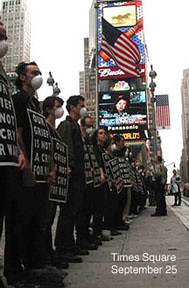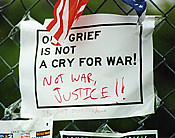

On March 11, the first anniversary of the terrible train bombing in Madrid which killed 191 and injured another 1900, I found this quote from a Spaniard describing what she felt after the attack.
"I saw people gathering in the streets, asking for justice, not revenge. We don't want another Guantanamo, we don't want a war, just the terrorists to be taken to court with all the constitutional guarantees. Because we are a democracy."
This year's Madrid international conference on terrorism (little reported in the US) featured speaker after speaker making the same point:
Javier Solana, EU foreign policy coordinator and former head of NATO, said respect for democracy had to be paramount. "In the struggle against terrorism we should be the first to uphold democratic values. It would be our first defeat if we resort to the methods of the terrorists."
Club of Madrid chief and former Brazilian president Fernando Henrique Cardoso said states must not take a the-end-justifies-the-means approach. "One can resort to the use of force if it is necessary -- but it must strictly adhere to international law."
Mary Robinson, a former Irish president and former UN high commissioner for refugees, warned of "a knock-on effect of a lowering of (democratic) standards" by some countries.
Even George Soros, the billionaire US financier, told Spanish radio station Cadena Ser, "The attitude of creating innocent victims creates terrorists. It's as simple as that. [The Bush Administration has] violated international law by using torture."
These are not modern or novel insights: the ancient Roman emperor Marcus Aurelius, called a "good emperor" for his temperate rule, advised "To refrain from imitation is the best revenge."
So what is it about contemporary US culture and society that makes us prey to leaders who responded to 9/11 by letting "loose the dogs of war?" (Yes, Shakespeare was talking about revenge too.)
Can it really be too many John Wayne movies? Surely our romantic enthusiasm for superheros is part of it. And surely another factor is that the people of this land have not suffered the reality of war in our own backyard for well over 100 years; we do not share the experiential wisdom of most peoples that almost any fate is preferable to war.
But above all, so far, our institutions have not been up to the task of restraining our lawless emotions. We were hurt, dramatically, on 9/11 and somebody has to suffer. We don't feel that legal responses, cooperation with allies, locking up terrorists, trying them, and imprisoning them up would be enough to satisfy our desire for revenge.
Can a complex and heavily armed society survive in which the rule of law is not felt good enough to govern our interactions? Much of what we consider the progress of human history has been about channeling our conflicts into non-violent institutions. We seem unable to remember that. Yes, we are cursed with elected rulers goading us to act on our base emotions; and we have chosen to reward them.
But if we actually want to survive as a species, letting ourselves be ruled by our hatreds and fears won't help us. The rest of the world seems bent on quarantining the dangerous US monster; those of us within the beast must strive as long as it takes to reshackle the lawless beast we've loosed.
Here's another solid piece of folk wisdom: While seeking revenge, dig two graves -- one for yourself.
No comments:
Post a Comment